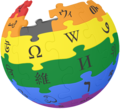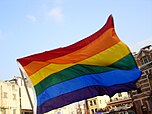
Back بوابة:مجتمع الميم Arabic Portal:LGBT Azerbaijani Партал:ЛГБТ Byelorussian Партал:ЛГБТ BE-X-OLD প্রবেশদ্বার:এলজিবিটি Bengali/Bangla Porched:Revelezh (LGBT) Breton دەروازە:کۆمەڵگەی پەلکەزێڕینە CKB Portal:Homo- und Bisexualität German Portal:LGBT DIQ Πύλη:ΛΟΑΤ Greek
| Main page | WikiProjects & Things you can do |

|
The LGBTQ+ Portal |

|

|

|
Introduction LGBT is an initialism that stands for "lesbian, gay, bisexual, and transgender". It may refer to anyone who is non-heterosexual, non-heteroromantic, or non-cisgender, instead of exclusively to people who are lesbian, gay, bisexual, or transgender. The variant LGBTQ adds a Q for those who identify as queer (which can be synonymous with LGBT) or are questioning their sexual or gender identity, while LGBTQ+ adds a plus sign for "those who are part of the community, but for whom LGBTQ does not accurately capture or reflect their identity". Many further variations of the acronym exist, such as LGBT+ (simplified to encompass the Q concept within the plus sign), LGBTQIA+ (adding intersex, asexual, aromantic and agender), and 2SLGBTQ+ (adding two-spirit for a term specific to Indigenous North Americans). The LGBT label is not universally agreed upon by everyone that it is generally intended to include. The variations GLBT and GLBTQ rearrange the letters in the acronym. In use since the late 1980s, the initialism, as well as some of its common variants, functions as an umbrella term for marginalized sexualities and gender identities. Some prefer the catch-all term queer. The earlier initialism LGB began to replace the term gay (or gay and lesbian) in the late 1980s to reference the broader community. When not inclusive of transgender people, the shorter LGB is still used. (Full article...) Selected article -Homosexuality has been documented in China since ancient times. According to one study by Bret Hinsch, for some time after the fall of the Han dynasty, homosexuality was widely accepted in China but this has been disputed. Several early Chinese emperors are speculated to have had homosexual relationships accompanied by heterosexual ones. Opposition to homosexuality, according to the study by Hinsch, did not become firmly established in China until the 19th and 20th centuries through the Westernization efforts of the late Qing dynasty and early Republic of China. On the other hand, Gulik's study argued that the Mongol Yuan dynasty introduced a more ascetic attitude to sexuality in general. For most of the 20th century homosexuality in China had been legal, except for a period between 1979 and 1997 where male anal sex was punishable as "hooliganism". (Full article...)Selected biography -Alan Mathison Turing OBE FRS (/ˈtjʊərɪŋ/; 23 June 1912 – 7 June 1954) was an English mathematician, computer scientist, logician, cryptanalyst, philosopher and theoretical biologist. He was highly influential in the development of theoretical computer science, providing a formalisation of the concepts of algorithm and computation with the Turing machine, which can be considered a model of a general-purpose computer. Turing is widely considered to be the father of theoretical computer science. Born in London, Turing was raised in southern England. He graduated in maths from King's College, Cambridge, and in 1938, earned a maths PhD from Princeton University. During the Second World War, Turing worked for the Government Code and Cypher School at Bletchley Park, Britain's codebreaking centre that produced Ultra intelligence. He led Hut 8, the section responsible for German naval cryptanalysis. Turing devised techniques for speeding the breaking of German ciphers, including improvements to the pre-war Polish bomba method, an electromechanical machine that could find settings for the Enigma machine. He played a crucial role in cracking intercepted messages that enabled the Allies to defeat the Axis powers in many crucial engagements, including the Battle of the Atlantic. (Full article...)Selected quote -
—Robert G. Ingersoll (1833–1899)
Current events
Selected image - Lesbian and gay students kissing in front of anti-homosexuality protesters at Oberlin College (Oberlin, Ohio, USA) in May 2000. Several hundred Oberlin College students turned out to rally against the protesters. The protesters—from Westboro Baptist Church of Topeka, Kansas—also protested the General Conference of the United Methodist Church while in Ohio.
Did you know… -
This month's birthdays
Selected lists
Related portalsFeatured contentThe following articles and lists have been identified as some of the best produced by the Wikipedia community:
TopicsCategoriesAssociated WikimediaThe following Wikimedia Foundation sister projects provide more on this subject:
Discover Wikipedia using portals |
© MMXXIII Rich X Search. We shall prevail. All rights reserved. Rich X Search























